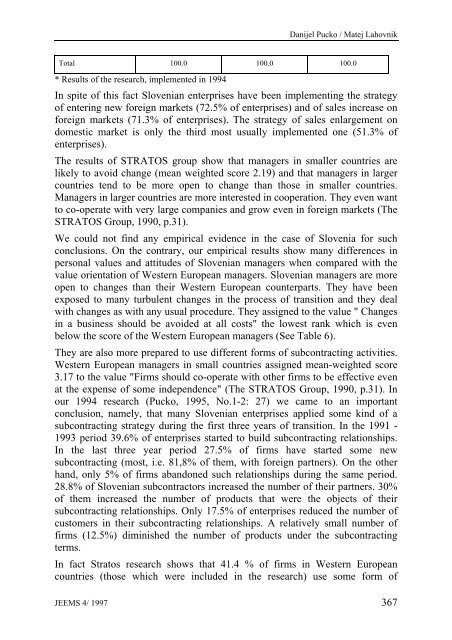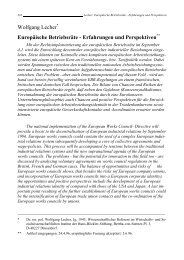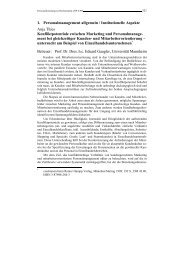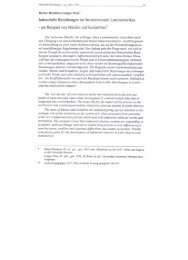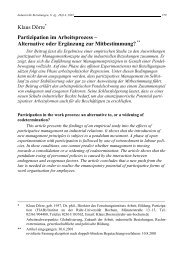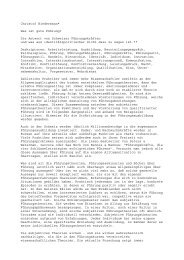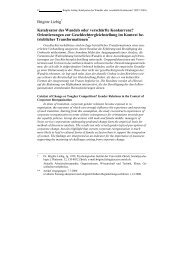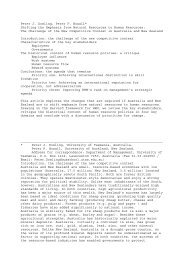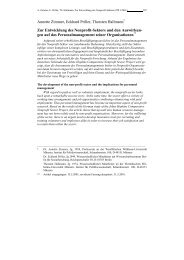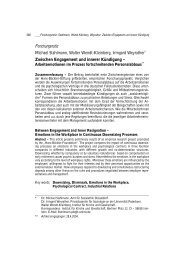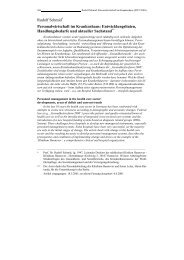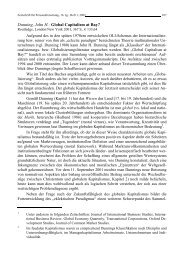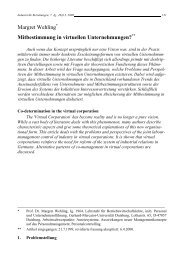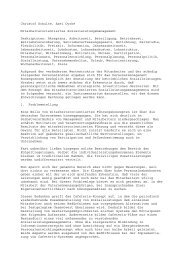JEEMS - Rainer Hampp Verlag
JEEMS - Rainer Hampp Verlag
JEEMS - Rainer Hampp Verlag
You also want an ePaper? Increase the reach of your titles
YUMPU automatically turns print PDFs into web optimized ePapers that Google loves.
Danijel Pucko / Matej Lahovnik<br />
Total 100.0 100.0 100.0<br />
* Results of the research, implemented in 1994<br />
In spite of this fact Slovenian enterprises have been implementing the strategy<br />
of entering new foreign markets (72.5% of enterprises) and of sales increase on<br />
foreign markets (71.3% of enterprises). The strategy of sales enlargement on<br />
domestic market is only the third most usually implemented one (51.3% of<br />
enterprises).<br />
The results of STRATOS group show that managers in smaller countries are<br />
likely to avoid change (mean weighted score 2.19) and that managers in larger<br />
countries tend to be more open to change than those in smaller countries.<br />
Managers in larger countries are more interested in cooperation. They even want<br />
to co-operate with very large companies and grow even in foreign markets (The<br />
STRATOS Group, 1990, p.31).<br />
We could not find any empirical evidence in the case of Slovenia for such<br />
conclusions. On the contrary, our empirical results show many differences in<br />
personal values and attitudes of Slovenian managers when compared with the<br />
value orientation of Western European managers. Slovenian managers are more<br />
open to changes than their Western European counterparts. They have been<br />
exposed to many turbulent changes in the process of transition and they deal<br />
with changes as with any usual procedure. They assigned to the value " Changes<br />
in a business should be avoided at all costs" the lowest rank which is even<br />
below the score of the Western European managers (See Table 6).<br />
They are also more prepared to use different forms of subcontracting activities.<br />
Western European managers in small countries assigned mean-weighted score<br />
3.17 to the value "Firms should co-operate with other firms to be effective even<br />
at the expense of some independence" (The STRATOS Group, 1990, p.31). In<br />
our 1994 research (Pucko, 1995, No.1-2: 27) we came to an important<br />
conclusion, namely, that many Slovenian enterprises applied some kind of a<br />
subcontracting strategy during the first three years of transition. In the 1991 -<br />
1993 period 39.6% of enterprises started to build subcontracting relationships.<br />
In the last three year period 27.5% of firms have started some new<br />
subcontracting (most, i.e. 81,8% of them, with foreign partners). On the other<br />
hand, only 5% of firms abandoned such relationships during the same period.<br />
28.8% of Slovenian subcontractors increased the number of their partners. 30%<br />
of them increased the number of products that were the objects of their<br />
subcontracting relationships. Only 17.5% of enterprises reduced the number of<br />
customers in their subcontracting relationships. A relatively small number of<br />
firms (12.5%) diminished the number of products under the subcontracting<br />
terms.<br />
In fact Stratos research shows that 41.4 % of firms in Western European<br />
countries (those which were included in the research) use some form of<br />
<strong>JEEMS</strong> 4/ 1997 367


